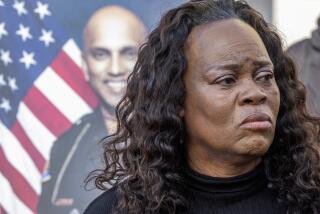Rodney King Tells Tustin Pupils of Ordeal : Appearance: In effort to help change his image, he tells audience that officers involved in his beating must be convicted to restore ‘decency’ to blacks.
- Share via
TUSTIN — In a rare public appearance intended to help change his image, Rodney G. King told students at Tustin High School on Wednesday night that the four LAPD officers involved in his 1991 beating must be convicted at their upcoming federal trial to help restore “decency” for blacks nationwide.
“We can’t just let them get away like this,” King said. “These thug police officers ought to be held responsible for their actions.”
King’s 90-minute appearance before an African-American student group was in sharp contrast to his past aversion to public exposure since the March, 1991, beating that sparked a national debate on racism and police brutality, and led to the trial of four officers whose acquittal touched off April’s Los Angeles riots.
The 27-year-old King acknowledged that he was nervous talking with and taking questions from about 75 students, most of them black. But he and his new attorney, Milton C. Grimes of Santa Ana, said he will now begin to make more public appearances--particularly in schools--to counter the image of him as a “monster” that they said has been perpetuated in the media.
“He shouldn’t be hidden in a closet--he has a message to send,” Grimes said. While he said he believes King was brain-damaged in the police beating, Grimes added that he wants to dispel an image of King as someone “who can’t talk and slobbers over himself. . . . He is who he is.”
One student asked King how he planned to change his image.
“I’m here today,” he said simply.
It was one of King’s few public appearances since he asked, “Can we all get along?” in a now-famous televised plea in the midst of the April riots. He gave several talks to law students earlier this week in the San Francisco Bay Area.
No television news stations were told of Wednesday’s event because Grimes said he wanted to avoid controversy and focus King’s appearance “on the kids.” Indeed, the students themselves were told they were going to hear Grimes talk, and most said they did not even know King would be there.
From the moment Grimes walked into the high school classroom with his most famous client, whispers filled the air. “That’s not Rodney King!” one student whispered. “It is too!” her classmate shot back.
King occasionally fumbled over his words and wandered from one idea to the next, but several students said they were surprised to see how articulate he appeared as he fielded their questions in a confident tone.
“I’m trying to get used to” the nervousness, he said. “Anyway I can give myself to you students, I’m all for it.”
Grimes and King both sought to focus the evening on the importance of education in the black community, urging students to stay in school and pay less attention to such matters as clothes and romances.
An 11th-grade dropout, King told the students that he was often distracted in school by other matters--such as football and fights. “I was pretty much a big guy in high schools. Guys wanna try you when you got a little size on you--you know, ‘beat the giant’. . . . I wasn’t gonna take no butt-whooping.”
But as much as King tried to talk about school, most of the students wanted to ask him about the 1991 beating and the tense months that followed.
Grimes would not allow discussion of some specific issues because of the pending trial of the four officers in federal court and King’s civil lawsuit. But King did speak openly about his emotions during that time.
For instance, when he first heard about the Simi Valley jury’s not-guilty verdict last April in the trial of the four officers, King said, “I felt like the world was caved in, was closed in on all of us as a whole. I couldn’t believe that they came back with that kind of a verdict.
“It put me back about 200 years--I could imagine what slaves felt like to be stripped of their decency,” he said.
He was “so mad,” King said, that he “went tearing up my car,” pulling out the dashboard and ripping out the glove compartment.
He’s not sure the emotional wounds will ever heal, he said.
“I’ve been trying to get my trust back in (police), but it’s hard. That’ll take a while,” King said. Later, he added: “There won’t be any forgiveness.”
Yet King at times seemed able to joke about the events of March 3, 1991, when he led police on a chase after they tried to stop him for speeding.
One student asked King how black men should react when pulled over by police.
“Don’t just keep driving,” King quipped, drawing laughs.
More to Read
Sign up for Essential California
The most important California stories and recommendations in your inbox every morning.
You may occasionally receive promotional content from the Los Angeles Times.










